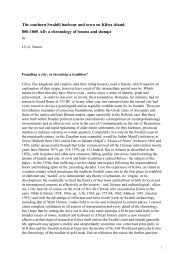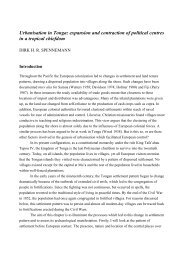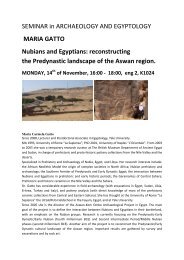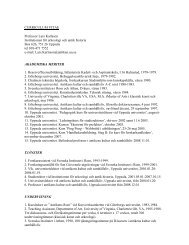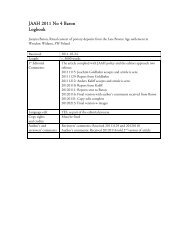Beowulf - Institutionen för arkeologi och antik historia
Beowulf - Institutionen för arkeologi och antik historia
Beowulf - Institutionen för arkeologi och antik historia
Create successful ePaper yourself
Turn your PDF publications into a flip-book with our unique Google optimized e-Paper software.
Wealhtheow, whose name means ‘celtic servant’, steps forward onto a stage<br />
dominated by four men: King Hroðgar, his brother’s son Hroðulf, <strong>Beowulf</strong> and<br />
Unfreð, the king’s most important official, his þyle or ‘speaker’, who is sitting at the<br />
king’s feet. The Queen’s two small sons and other young men are also in the hall.<br />
To begin with both Hroðgar and Hroðulf are called good; later, towards the end of<br />
her speech, Wealhtheow expresses the hope that Hroðulf will honour the goodness<br />
once showed to him by Hroðgar and Wealhtheow and be good to her children, should<br />
her husband die first; finally, she turns to the bench where her sons are sitting and there<br />
we also find the good Geat, <strong>Beowulf</strong>. Unfreð is not called good since that is not what<br />
he is; on the contrary he is one of the symptoms of the crisis at the Danish court. The<br />
crisis thus reflected in Unferð’s somewhat rotten Danish character makes us suspect<br />
that killing Grendel is perhaps not enough to solve all problems.<br />
So, if we remember the beginning of the poem, when princes are advised to be<br />
generous (vv. 20 ff.) and also the fact that Hroðgar knew <strong>Beowulf</strong> when <strong>Beowulf</strong> was<br />
a child, we can understand why <strong>Beowulf</strong> is sitting next to the princes and the point in the<br />
Queen’s speech besides her wish to secure her children. To remember the good once<br />
done to us is to be ready to do the good in return rather than fighting each other.<br />
The speech concerns the behaviour of a king when there is peace in his country, but<br />
more so peace in the family, since before Wealhtheow speaks we have been informed<br />
that the events in <strong>Beowulf</strong> (Part I) happened when there was still peace and faith<br />
between Hroðgar and Hroðulf, and at the same time we have been told quite bluntly<br />
that Unfreð is a deceitful and false character. This is the author’s flashback to what he<br />
believes are the actual historical events into which he fits his more fictional tale about<br />
<strong>Beowulf</strong>.<br />
There is obviously a need for reconciliation and Wealhtheow underlines her<br />
speech by urging the men to drink in a ceremonial or ritual way. Wealhtheow tries to<br />
secure her sons by creating a balance between the four power factors and binding<br />
them to continue to be good. Of course we cannot hope for Unferð to be good, but<br />
we can hope for an axis of trust between <strong>Beowulf</strong> and the King and that <strong>Beowulf</strong>,<br />
who is symbolically seated between the sons, will save them if needed.<br />
It is worth noting that the power constellation in Hroðgar’s hall is the same as that<br />
which characterises two petty kingdoms in the early Landnám-phase in Iceland,<br />
namely: the King, one of the King’s close relatives, his foremost official and the<br />
outsider (Herschend 1994) (Fig. 31). In Iceland these cornerstones are represented<br />
by four different farms dominating the landscape, but obviously when the owners of<br />
these farms meet they are the prominent men in the hall. There is hope in this model<br />
of balanced power, and Wealhtheow’s speech shows its close affinity with goodness.<br />
The model may not always succeed in keeping the peace, but it is a constitutional<br />
model for preventing tragedies like the slaughter at Finnsburg. The Queen can<br />
hardly hope to convince the drunken retainers in the hall of the benefits of peace, but<br />
she may succeed with the four leaders of the kingdom. That is why she directs her<br />
86



